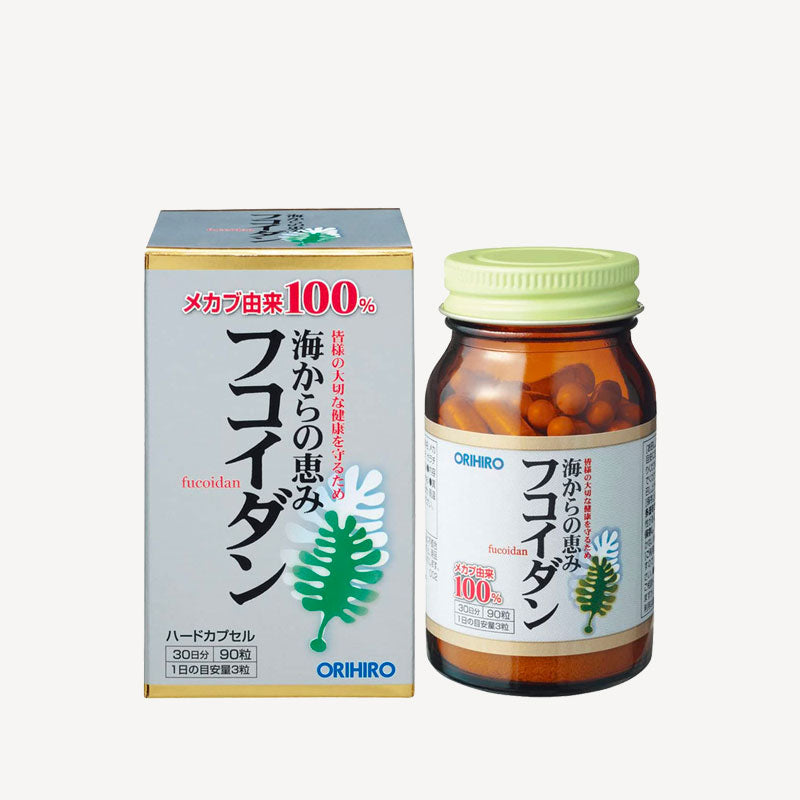About the origin of Fucoidan?
In 1913, a Swedish scientist H.Z.Kylin discovered it at Uppsala University, named it as Fucus genus, and related to seaweed. Since the 1970s, more and more studies have begun to focus on it. In 1996, the Japanese Cancer Society reported that it has anti-cancer effects, thus it began to be a health food of great concern.

Fucoidan is a kind of polysaccharide substance, which is often found in seaweed, such as kelp, nori and dulse. Similarly, this substance can also be found in some animals such as sea dragons. In food, seaweed can be consumed through drying or pickling, or made into soy sauce or seaweed paste. High-concentration seaweed powder or seaweed extract can also be used to make supplements.
The effects of Fucoidan.
Research has found that Fucoidan has antioxidant, anti-inflammatory, and immune-regulating effects. The sulfated polysaccharides in Fucoidan have strong antioxidant properties, which can help protect cells from damage caused by free radicals. Additionally, these compounds may help inhibit the production of inflammatory substances, thereby reducing systemic inflammation.

1.For individuals with cardiovascular disease:
Fucoidan may lower cholesterol levels, reducing the risk of cardiovascular disease. It can lower the levels of low-density lipoprotein cholesterol (LDL-C) and total cholesterol, and increase the levels of high-density lipoprotein cholesterol (HDL-C). Additionally, it may also decrease blood clotting and improve vascular function. Therefore, Fucoidan is thought to be a potentially beneficial substance for preventing cardiovascular disease.
2.For individuals with cancer:
Fucoidan may have anti-cancer properties, particularly for stomach and lung cancer. Its mechanism may involve various factors, such as activating the immune system, inducing apoptosis, preventing angiogenesis, inhibiting cancer cell migration and invasion, and preventing cancer cell adhesion. Among these, sulfated polysaccharides may enhance the immune system by activating macrophages, induce apoptosis by activating NK cells, prevent angiogenesis by blocking VEGF receptor binding, inhibit migration and invasion by blocking the expression of MMP-2 and -9, and prevent cancer cell adhesion through its glycosylation-inhibitory activity. These mechanisms may play important roles in cancer-fighting.
3.People with immune system diseases:
Fucoidan can improve immune system function. For example, it can enhance the function of immune cells such as activating T cells and natural killer cells and enhance the immune response. Therefore, Fucoidan is considered to be potentially beneficial for enhancing immune system function.
4.People with skin health issues:
Fucoidan can protect the skin from UV damage and delay the aging process. Additionally, it can improve skin moisture balance, promote skin repair, and reduce inflammation and promote anti-inflammation. Therefore, Fucoidan is considered to be potentially beneficial for improving skin health.
5.People with intestinal health issues:
Fucoidan can promote intestinal flora balance and reduce inflammation. Additionally, it can improve intestinal function, such as increasing peristalsis and preventing constipation. It can also reduce the incidence of gastrointestinal diseases. Therefore, Fucoidan is considered to be potentially beneficial for improving intestinal health.
Further research also suggests that Fucoidan can prevent diabetes by improving insulin sensitivity and glucose metabolism. It can inhibit the absorption of carbohydrates and lower blood sugar and insulin levels. Additionally, Fucoidan's anti-inflammatory and antioxidant properties may also contribute to preventing diabetes.
There is currently no clear scientific evidence on how to effectively take Fucoidan. Generally, it is considered optimal to consume 150 milligrams or more per day. It is also important to follow the recommended intake on the product label as the effect may vary depending on the amount consumed.
When taking Fucoidan supplements, the following points should also be considered
- Ensure purity: Make sure that the selected health food contains high-purity Fucoidan and that the content is indicated on the label.
- Choose source: Choose health food from reliable suppliers and sources of origin.
- Read the ingredient list: Carefully read the ingredient list to ensure that there are no unnecessary or harmful ingredients.
- We also recommend consulting a doctor or professional before taking Fucoidan supplements.






